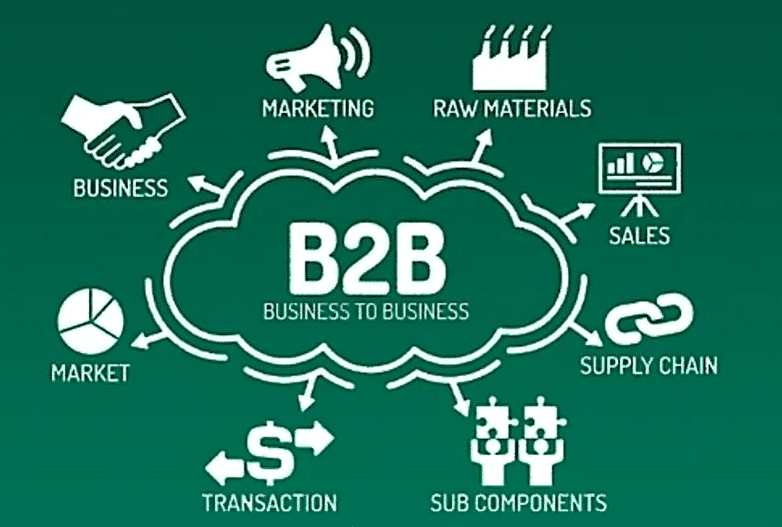How B2B Sales Teams Win with Digital Commerce : In today’s rapidly evolving business landscape, B2B sales teams are increasingly turning to digital commerce to drive growth and stay competitive.
With advancements in technology and changes in buyer behavior, leveraging digital platforms has become essential for success.
This article explores how B2B sales teams can harness the power of digital commerce to win in the modern marketplace.
Introduction to B2B Sales Teams
B2B sales teams play a crucial role in driving revenue and maintaining customer relationships for businesses operating in the business-to-business sector. Traditionally, B2B sales have relied on face-to-face interactions, phone calls, and emails to engage with prospects and close deals.
However, with the rise of digital commerce, the sales landscape is undergoing a significant transformation.
Understanding Digital Commerce
Digital commerce encompasses the buying and selling of goods and services using electronic platforms such as websites, mobile apps, and online marketplaces. In the B2B context, digital commerce includes transactions between businesses, such as manufacturers, wholesalers, and distributors.
Over the years, digital commerce has evolved from simple online transactions to complex ecosystems that facilitate seamless business interactions.
The Role of B2B Sales Teams in Digital Commerce
B2B sales teams must adapt to the changing preferences and behaviors of modern buyers. Today’s B2B buyers are increasingly turning to digital channels to research products, compare prices, and make purchasing decisions. To remain relevant, sales teams must embrace digital tools and platforms to engage with customers throughout the buying journey.
Strategies for Success
To succeed in digital commerce, B2B sales teams must employ effective strategies that resonate with their target audience. Building a strong online presence is essential for attracting and retaining customers. This includes optimizing websites for search engines, maintaining active social media profiles, and producing valuable content that educates and informs prospects.
Personalizing the customer experience is another key strategy for success in digital commerce. By leveraging data and analytics, sales teams can tailor their offerings to meet the specific needs and preferences of individual customers. This could involve recommending relevant products, offering personalized discounts, or providing proactive support.
Integrating sales and marketing efforts is also critical for success in digital commerce. By aligning these two functions, businesses can ensure a cohesive and consistent brand experience across all touchpoints. This may involve sharing customer insights, coordinating marketing campaigns with sales activities, and collaborating on lead generation efforts.
Key Technologies and Tools
B2B sales teams have access to a wide range of technologies and tools that can help them succeed in digital commerce. Customer Relationship Management (CRM) systems are essential for managing customer interactions and tracking sales activities. E-commerce platforms provide the infrastructure needed to conduct online transactions and manage product catalogs. Data analytics and artificial intelligence (AI) tools enable sales teams to gain valuable insights into customer behavior and make data-driven decisions.
Overcoming Challenges
While digital commerce offers many opportunities for B2B sales teams, it also presents challenges that must be addressed. Security and privacy concerns are top of mind for businesses operating in the digital space. Sales teams must ensure that customer data is protected and that transactions are conducted securely to maintain trust and credibility.
Resistance to change within organizations can also hinder the adoption of digital commerce strategies. Sales teams may encounter pushback from colleagues who are accustomed to traditional sales methods or who are skeptical of new technologies. Overcoming resistance to change requires effective communication, training, and leadership support.
Case Studies and Success Stories
Numerous B2B companies have successfully embraced digital commerce to drive growth and achieve their business objectives. For example, Adobe transformed its sales process by implementing a digital-first approach that prioritized online transactions and self-service options. As a result, the company saw significant increases in revenue and customer satisfaction.
Future Trends and Innovations
Looking ahead, the future of B2B digital commerce is bright, with continued advancements in technology driving innovation and change. Predictive analytics, machine learning, and augmented reality are just a few of the trends shaping the future of B2B sales. By staying abreast of these developments and embracing new technologies, B2B sales teams can position themselves for success in the years to come.
Conclusion
In conclusion, digital commerce presents immense opportunities for B2B sales teams to drive growth and stay ahead of the competition. By embracing digital tools and platforms, adopting effective strategies, and overcoming challenges, B2B sales teams can win in the modern marketplace. As technology continues to evolve and consumer preferences shift, it’s essential for sales teams to remain agile and adaptable to succeed in the digital age.
FAQs
How can B2B sales teams leverage data analytics in digital commerce?
B2B sales teams can use data analytics to gain insights into customer behavior, identify trends, and make informed business decisions.
What role do e-commerce platforms play in B2B digital commerce?
E-commerce platforms provide the infrastructure needed to conduct online transactions, manage product catalogs, and streamline the buying process for B2B customers.
How can B2B sales teams overcome resistance to change within organizations?
Overcoming resistance to change requires effective communication, training, and leadership support. Sales teams should focus on highlighting the benefits of digital commerce and addressing any concerns or objections from colleagues.
What are some examples of successful B2B companies in digital commerce?
Adobe is a prime example of a B2B company that successfully embraced digital commerce to drive growth and improve customer satisfaction. By prioritizing online transactions and self-service options, Adobe saw significant increases in revenue and customer engagement.
What are some future trends shaping the landscape of B2B digital commerce?
Predictive analytics, machine learning, and augmented reality are just a few of the trends shaping the future of B2B sales. By staying abreast of these developments and embracing new technologies, B2B sales teams can position themselves for success in the years to come.


